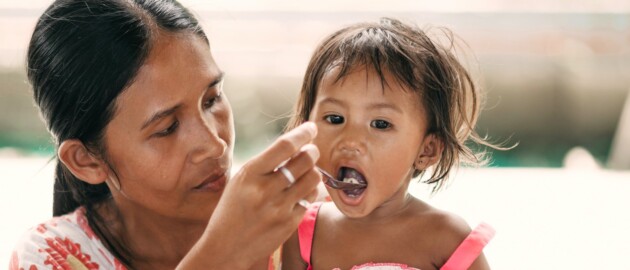Bridging the fortification gap in the Philippines
Nutrition International is leading a collaborative effort to improve the micronutrient status of women, adolescent girls and children in the Philippines by improving fortification policies.

Iodine helps a child’s brain develop properly.
Iodine consumption is critical for pregnant women and children to ensure full brain development and protection from mental impairments. Adding iodine to salt reduces global iodine deficiencies.
Iodine deficiency disorders remain a global health concern.
Iodine is only needed in small amounts and is often consumed in the foods we eat. But when plants and animals are raised in areas with iodine-deficient soil, the diet for people there often lacks the recommended amount of iodine.
Despite the success of salt iodization, 30% of households globally are still not consuming salt that has been adequately iodized.
Iodine deficiency is most damaging during fetal development and in the first few years of a child’s life. It is estimated that 38 million babies are born every year to iodine-deficient mothers, missing out on the protection that iodine offers the growing brain, and a full 18 million are mentally impaired as a result.
Salt iodization is one of the greatest global health success stories.
For more than a decade, Nutrition International has been working to expand and speed up the adoption of universal salt iodization around the world.
Working with local salt industries, mostly small- and medium-scale salt producers, we provide easy iodization techniques and ensure they have the tools, equipment and training they need to be effective. We also provide technical and logistical support to develop profitable business plans and encourage salt producers to form cooperatives to pool resources, and improve production techniques, quality, packaging and marketing.
We support national governments in designing iodine deficiency control programs, including legislation and monitoring, and helps them work successfully with salt producers. Local governments are brought on board to help finance the cooperatives and monitor the iodization.
We’ve helped countries around the world produce enough iodized salt to reach 440 million people.
Along with partners, donors, governments and the private sector, we have worked to:
Women: an important group
We address the needs of women through universal salt iodization.
Our USI program aims to improve the consumption of adequately iodized salt by the general population, and particularly women, as adequate iodine status during pregnancy is key to preventing iodine deficiency disorders among newborns
We aim to empower women through capacity building and promoting the emergence of women’s entrepreneurship in salt production.
Women also represent an important group as they take on roles as processors, advocates and monitors depending on the context. In some countries, such as Senegal, women represent a large proportion of small-scale processors. Capacity building to improve the quality of their entrepreneurial activities contributes not only to the quality of iodized salt produced, but also to their personal and household economic empowerment.
In many of our implementation countries, women have assumed increasingly prominent leadership roles at the community level as monitoring agents to ensure the appropriate enforcement of standards.
Discover our projects around the world
Find Nutrition International iodine fortification projects.